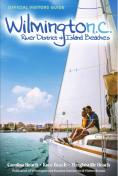I have always been fascinated with Black history and like to point out that it is truly American history. Wilmington is a city in southeastern North Carolina full of culture and coastal charm. It is an integral part of Black History and has played a pivotal role in the landscape of American History. I grew up in Wilmington and more than five generations of my family are from this area. I am intrigued by the rich past of Wilmington that has often been omitted. The more I learn the more there is to know, including those bright and dark moments. There are a variety of ways to participate and learn about the vast history and heritage of African Americans, and I recommend that everyone begin that journey for themselves. You can take the first step by participating in guided and self-guided tours, and visiting local museums, attractions, and events.
BLACK HISTORY TOURS:
Wilmington History Tours’ African American History Tour is available via App as a self-guided tour with 32 sites to be enjoyed over one or several outings.
A Guide to Wilmington’s African American Heritage is a free online guide with 37 sites, including: 1898 Monument & Memorial Park, Orange Street Landing on Cape Fear (a National Underground Railroad Network to Freedom site), the Wilmington Journal, and historically significant homes, churches, cemeteries, schools, businesses and markers.
Journey Wilmington African-American History Tours offers four by-request, advance reservation tours: 1898 Wilmington Massacre and Coup; Southside Legacy; Sugar Hill Neighborhood; and a citywide tour. To schedule, email spellerislah@yahoo.com.
WilmingtonNColor Shuttle Tours specializes in the history of the only successful coup d'état on U.S. soil that took place in Wilmington in November 1898. For details on this by-request tour visit the WilmingtoNColor website.
MUSEUMS/ATTRACTIONS:
Cape Fear Museum of History & Science’s (814 Market St., Wilmington) Cape Fear Stories exhibit interprets the region’s rich and complex history, including experiences of African Americans. The museum offers educational programs, resources, traveling exhibits, and ongoing exhibits that explore Black History.
Cameron Art Museum (3201 S. 17th St., Wilmington) is a cultural gathering place that is home to the Minnie Evans Study Center, an archive and research repository for the N.C. folk artist’s work. The museum was built on the site of the Battle of Forks Road, a Civil War skirmish whose victory was won by the United States Colored Troops (USCT). Visit the USCT Sculpture Park, within the historic Forks Road Civil War Site. View Stephen Hayes' sculpture, "Boundless," commemorating the soldiers of the United States Colored Troops who fought on the site. Walk along the only remaining vestige of historic Federal Point Road, the primary thoroughfare in the 1860s from Fort Fisher to Wilmington. See a reconstruction of the Confederate revetments which originally spanned a course of five miles from the Cape Fear River to present-day Long Leaf Park. On the NC Civil War Trails marker, read about the Forks Road battle on Feb. 20-22, 1865 fought victoriously by 1600 United States Colored Troops, contributing to the Fall of Wilmington on Feb. 22, 1865.
Bellamy Mansion Museum of History & Design Arts (503 Market St., Wilmington) was built by free and enslaved Africans. Its grounds include two 2-story brick structures: a reconstructed carriage house and restored urban slave quarters. It is a site on the National Park Service’s Gullah Geechee Cultural Heritage Corridor.
Thalian Hall Center for Performing Arts/City Hall (310 Chestnut St., Wilmington) was built by free and enslaved African craftsmen. Many famous African Americans have appeared on stage, including abolitionist Frederick Douglass; educator Booker T. Washington; singers Marian Anderson, Ethel Waters, and opera soprano Caterina Jarboro.
Minnie Evans Tribute Garden & Bottle Chapel at Airlie Gardens (300 Airlie Rd., Wilmington) honors visionary artist and longtime Airlie Gardens’ employee, Minnie Evans.
Poplar Grove Plantation (Hwy. 17 in Scotts Hill, NC), formerly a sweet potato and peanut plantation, is part of the National Park Service Gullah Geechee Cultural Heritage Corridor. Tours and exhibits explore Gullah Geechee history as it relates to the Black families who lived and worked there.
PUBLIC ART:
1898 Monument and Memorial Park (1074 N. 3rd St., Wilmington), dedicated in November 2008, was designed by Atlanta sculptor Ayokunle Odeleye. The monument memorializes the African Americans harmed by the violence of the 1898 insurrection and honors those who have continued work for racial progress.
Because It’s Time, a Black Lives Matter sculpture by NC artist Dare Coulter. The sculpture is located on the UNC-Wilmington campus near the University Commons outside of the Fisher Student Center and University Union. UNCW, 600 S. College Rd., Wilmington.
On the deck-side of On Thyme, a Black-owned restaurant in Wilmington's Castle Street Arts District (918 Castle St.), is a mural celebrating landmarks and legends of Wilmington’s African-American community: Harlem Globetrotter Meadowlark Lemon, NBA star Michael Jordan, International Tennis Hall-of-Famer Althea Gibson and her mentor Civil Rights activist/community leader Dr. Hubert Eaton, the Williston School tiger mascot, restaurant owners Corey and Phallin Scott and Linwood “Booty” Davis whose legendary restaurant, Booty’s Soul Food, was located here until his retirement in 2020.
ANNUAL EVENTS:
- The North Carolina Black Film Festival is a four-day juried and invitational festival of independent motion pictures by Black filmmakers. Organized by the Black Arts Alliance, the festival is held in the spring (dates vary) with events at the Cameron Art Museum and UNCW.
- Battle of Forks Road Living History Commemoration, February, Cameron Art Museum
- Juneteenth Festival Week (June)
- More Cultural Events that observe Wilmington's African American Heritage are held throughout the year. Find details on the Wilmington and Beaches searchable calendar.
Explore African American History at the Cape Fear Museum of History & Science and find more Cultural Events that observe Wilmington's African American Heritage.


